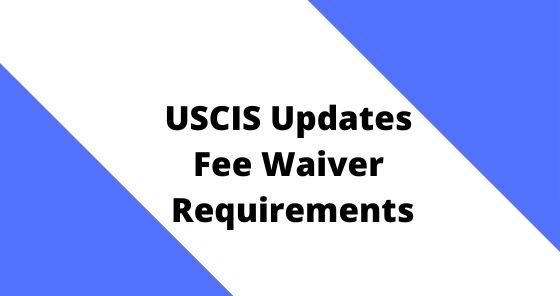On Friday, October 25, 2019, the United States Citizenship and Immigration Services (USCIS) announced that there would be a change to its process of determining applicants’ eligibility for a waiver for immigration fees. According to the release, the new rule, which will become effective on December 2, 2019, will require more than the means-tested benefit criteria previously used to prove eligibility for a waiver.
The revised requirement has narrowed the fee waiver eligibility criteria to only those that can show that:
- Their documented household annual income is at or below 150 percent of the Federal Poverty Guidelines; or
- They demonstrate financial hardship.
What is a Visa Fee Waiver Request?
Almost all visa forms filed with the USCIS have a filing fee that must be paid by applicants or petitioners. Depending on the visa classification you are applying for, you may end up spending thousands of dollars on these processing fees. A marriage-based visa application, for instance, may end up costing petitioners around $2,000.
Some visa applicants don’t have the financial capacity to afford these fees. To ensure their immigration journey is not cut short, the USCIS made a provision to allow people to petition for a visa without having to pay the processing fees. This provision is known as the visa fee waiver.
How Does Fee Waiver Work?
If you need a visa fee waiver, you will make a request to the USCIS by filing an I-912, Request for Fee Waiver with proof that, due to your financial status, you cannot afford the fee for the visa classification form(s). The USCIS uses means-tested benefits to determine if an applicant should be exempt from paying filing fees or biometric services costs.
For instance, those receiving benefit programs such as Medicaid, Supplemental Nutrition Assistance Program (SNAP), Temporary Assistance to Needy Families (TANF), and Supplemental Security Income are usually eligible for the fee waiver program. Those enrolled in Medicare, social security benefits, unemployment benefits, Social Security Disability Insurance (SSDI) and student financial aid, loans, or grants may also be eligible.
Also, if your household income is at or below 150 percent of the Federal Poverty Guidelines, you can request a visa fee waiver. There are other criteria that are also considered by the USCIS as long as you can present convincing evidence showing that you are going through a financial hardship that makes it difficult or impossible for you to pay the fee. This can be due to the loss of a job, medical emergency, or eviction.
What Does This New Proposal Mean for Visa Applicants
With this new update, it will become more difficult for people to prove their eligibility for the fee waiver program. Currently, almost 40% of naturalization applicants use a fee waiver for different reasons. The new requirements will most likely affect low-income immigrants and seniors the most and make it more difficult for many legal immigrants to become U.S. citizens.
New Visa Fees
Apart from the new fee waiver requirements, the USCIS also proposed major fee increases for immigration-related applications on November 8, 2019. Under the new fee proposal, the application for naturalization fee will increase to $1,170, which is a substantial increase of over 60% from the current $725.
The USCIS also proposed a new fee of $50 for those seeking asylum, which, according to the agency, is to discourage “frivolous filings.” Keep in mind that people seeking asylum are not legally permitted to work in the U.S. until they have received asylum. As many people seeking asylum flee with very little, the proposed $50 could be devastating.
The green card application is another immigration process to be affected by the proposed fee increase. For instance, green card applicants living in the United States would pay a total of $2,750, which is an increase of $990 (56%) from the current $1,760 filing fee. With all these increases coupled with more regulation surrounding fee waiver requests, it will become more expensive to immigrate, and will also be more burdensome for low-income earners.
Sentiment Surrounding New Proposal
As expected, the proposal has generated two contrasting views. While the immigration agency sees it as a laudable move, the general public seems to have a completely different opinion. From all indications, the proposal is being considered as a broader effort by this administration to restrict legal immigration into the United States further.
“The Trump Administration is trying to do an end-run around the FVRA to implement its elitist and discriminatory immigration policies,” said John Yang, the president and executive director of Asian Americans Advancing Justice. Many other stakeholders and concerned public members also shared Yang’s perspective. “The American promise must be open to all,” said Jenny Durkan, the mayor of Seattle. Durkan, just like many opposing voices, believed that wealth is not and should not be a requirement of being an American citizen, and stated that Seattle stood against any “pay-to-play approach to citizenship.
However, according to Ken Cuccinelli, the USCIS acting director, “the revised fee waiver process is going to improve the integrity of the program and the consistency and quality of fee waiver approvals going forward.” He believes it will help in “providing clear direction to agency adjudicators for more uniform determinations and will help us to uphold our mission of efficiently and fairly adjudicating immigration requests.” The agency argued that it relies on visa processing fees to cover the costs of adjudication petitions and applications, implement operational efforts, and ensure the lawful immigration process is properly administered.
What Will Happen to Previously-Filed Fee Waiver Requests?
The updated fee waiver requirements will not be in force until December 2, meaning the waiver requests postmarked before the date will be adjudicated under the previous policy. So, if you have already submitted a request or you are planning to submit before December 2, you will be eligible to use the old policy.
However, once the new policy goes into effect, the USCIS will start rejecting any waiver request filed with the old version of the I-912, a fee waiver request submitted with a letter, or documents showing you are using or have used the public benefit to show eligibility for a fee waiver. The proposed regulation will remain open for public comment until November 27, and there is a likelihood that the USCIS will face opposition in court if it goes on to implement the changes.
How VisaNation Law Group Immigration Attorneys Can Help
Understanding the nuances of visa law, along with the ever-changing costs and fees associated with it, can be extremely challenging for those outside the industry. VisaNation’s team of highly qualified and experienced lawyers specialized in various immigration processes, including naturalization, nonimmigrant visas, and green card applications. You can schedule a consultation with us today by filling out this contact form.
 Shilpa Malik
Shilpa Malik  Sabrina Saada
Sabrina Saada 